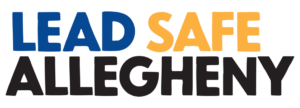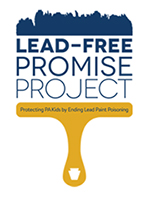
Coalitions and Collaborators
Women for a Healthy Environment strives to make information and solutions to complex problems more accessible to all in our communities through connecting families to resources and programming. WHE collaborates with dozens of partners to protect community members, especially children, from the irreversible damage caused by environmental toxins in homes, schools and early learning centers.
Our core focus areas for community-based programming include climate change, lead, radon, air and water quality, soil, and homes.

Lead Safe Allegheny
Lead Safe Allegheny is a county-wide coalition that envisions a community where all children and their families live and grow in a lead-safe environment. The mission of the Lead Safe Allegheny Coalition is to provide leadership and advocacy to advance strategic initiatives and foster collaboration among the community by focusing on primary prevention and ultimately creating a lead-safe environment.
Dedicated resources are needed for lead testing, screening, lead hazard control, and abatement. Assistance for community education and organizing, workforce development for lead professionals, increasing the supply of safe, affordable housing options, training in lead-safe work practices for property owners, contractors and more is needed.

GLLEN
WHE serves as the Pennsylvania representative in the Great Lakes Lead Elimination Network (GLLEN), convened by the Ecology Center. GLLEN has identified local, state, and federal priorities to help reach the objective of eliminating lead poisoning. Our state priorities include:
- Universal lead testing for all kids aged 1 and 2
- Shifting the burden of proof to landlords, including documentation of remediation after a child is poisoned and inspections/remediation prior to renting a unit
- Funding for lead abatement & lead poisoning prevention programs.
- Align with State or local Lead Commissions and boards.
- Requiring contractors to have lead-safe certifications to do work on homes built before 1978.

Lead-Free Promise Project
WHE is a proud member of The Lead-Free Promise Project. This coalition of physicians, advocates, and parents is protecting PA kids by ending lead paint poisoning.
The coalition, led by Co-Chairs Dr. Harriett Okatch of Franklin & Marshall College and Colleen McCauley, Health Policy Director for Public Citizens of Children and Youth (PCCY), has two primary goals:
- Establishing a state fund for homeowners and landlords to remove lead paint-based hazards in their properties, and
- Passing legislation that will require all children to be screened for lead poisoning.

Radon in Schools
WHE created the Radon in Schools Workgroup in 2019 to advocate for legislative action to protect children from radon exposure in schools and childcare centers. We advocate for the following PA policy solutions:
- Require all school buildings test for radon after any new construction or major renovation OR every 5 years, whichever comes first.
- Create an advisory board with medical and public health professionals, certified radon scientists and other experts to provide guidance to schools on best practices and health-based standards.
- Require school districts to submit plans for remediation to the DEP if radon levels are found above 4 pCi/L.
- Require schools to make their testing data and any applicable plans for remediation public within 90 days of receiving results.

Healthy Schools
Every child deserves to learn in a healthy school. The Commonwealth’s K–12 education system serves more than 1.7 million students across 500 public school districts. The importance of healthy schools cannot be overstated.
Healthy schools are not just about our buildings, but rather about our commitment to ensuring that every child has the opportunity to succeed. That opportunity includes learning in an environment that is safe, clean, healthy, dry, and pest-free; in an environment that encourages health promoting behaviors, where green space is accessible, and healthy nutritious food is available to all; and where mental, behavioral, and socioemotional services, are accessible to help serve the growing needs of families across the commonwealth. The research is clear that when we act, we see a difference – improved absenteeism, improved health outcomes, healthy cognitive development, and the ability to achieve academic potential.
While there are many known health hazards presented, the State of the Schools report also includes preventative strategies that school districts can immediately undertake to protect students, teachers and staff from environmental harm. Healthy Schools PA offers free technical assistance and guidance to schools and should be considered a valuable partner and resource for identifying incremental steps to improve a school district’s environmental health. We work with schools to assist with everything from environmental health education, curricula, and policy and procedure reviews that will lead to a healthier school community.
This report is a call to action. We have an unprecedented opportunity to reinvest in our schools for the long-term—to fund school infrastructure that can positively impact current and future generations of learners across the commonwealth. The challenge ahead of us is to act to ensure a healthy school for every child to grow, learn, and play.

Cancer and Environment Network of Southwestern PA

The Cancer and Environment Network of Southwestern PA is a network of concerned citizens who advocate for policy change that will reduce exposure to harmful chemicals that are known to cause cancer and other health defects.
